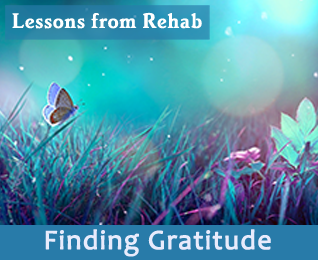 Within the past year, I spent several weeks, twice, in a post-hospital care facility to receive strengthening physical therapy. The first visit was the result of a fall that broke two of my ribs, which then resulted in pneumonia. During my stay, I discovered just how ifficult it could be to live in rehab.
Within the past year, I spent several weeks, twice, in a post-hospital care facility to receive strengthening physical therapy. The first visit was the result of a fall that broke two of my ribs, which then resulted in pneumonia. During my stay, I discovered just how ifficult it could be to live in rehab.
After returning home from the rehab facility, the first time, I reflected upon and wrote about some of my experiences and lessons learned about coping with the day-to-day life inside the facility. The insights helped me immensely when I recently found myself, again, living in rehab.
Without a doubt, the second time was much easier because of the important lessons learned during my first visit. It is my hope that they might also help you, or a loved one, during a similar situation.
Lesson 1: The Power of Genuine Gratefulness
From my perspective, how to say “Thank You” and mean it, even in the face of feeling as if no one there, really, “cared about me,” was one of the most important lessons learned. This realization was driven home on the very first day of rehab. It took about two days to learn how to show (and feel) sincere gratitude to staff members for even the most minor ways in which they were tending to me, even if some things that I desired, or felt that I needed, were not yet being attended to.
Certainly, I couldn’t fake and pretend to be grateful for what I wasn’t grateful for, and I couldn’t avoid some uncomfortable situations; they had to occur. Surprisingly, I discovered that it wasn’t impossible at all to take notice of things that I could express my gratitude for and it soon became automatic.
In order to give appreciation of even something that didn’t really work out well for me, I needed to more fully understand the viewpoints of those assisting me. So, I began asking the staff questions and one of the first things that struck me was a money issue.
One staff member told me that most of the personnel (except the leaders of the unit) received low hourly wages, even on the night shift, which was a very difficult shift in many ways. There was also a high turnover rate at the facility, a situation that is widespread in the health care industry. In fact, a 2017 Compensation Data Healthcare Pay and Benefits survey, from Compdata Surveys & Consulting, found that the total turnover rate in the healthcare industry for 2017 was 20.6% versus 17.7% in 2014.
Given the type of specialty training and high stamina that is required of rehabilitation workers, low wages and a relative lack of received appreciation can play a large part in turnover rates. Certainly, and even more importantly, those conditions can breed resentment and ill feelings between workers, and sometimes, toward patients.
I am not making a plea for anyone on either side – helper or patient – to be more understanding. This is a simple statement of reality to take into account if you want to live reasonably comfortable in a rehabilitation facility and give yourself the best chance to recover.
When considering what staff members must deal with, I knew that it was essential for me to be able to notice whatever real “good” was occurring in any given situation. During a time of great stress, feeling out of sorts, fatigue, illness, fear, and pain, it is far too easy to turn your focus inward and forget important social skills that you learned to use in many other areas of life, such as showing gratitude and empathy.
While it can be difficult to feel gratitude under demanding situations, try to remember that when someone who is serving you receives sincere, unexpected appreciation, and they know your gratitude is genuine – positive change in attitudes and behavior can emerge.
How to Give Genuine Thanks (Even if you feel ill served)
To do this, it is important to assess the thoughts going through your mind. Determine how you are viewing a situation, and how you could possibly view the situation in a way that will enable you to feel and express true gratitude.
Doing so made a true difference for me, and it undoubtedly could be heard my voice, seen in my eyes, and was expressed in my body language. When I really did appreciate something, it was obvious to a staff member involved in an interaction with me and it surely would have been obvious if I hadn’t appreciated it.
For example, during one instance, it was 2:00 a.m., my bedclothes had become twisted around me, and I felt like I could barely move, which was quite frightening. Such a situation can easily happen in this type of environment where comfort may not always be up to “one’s personal standard” of comfort.
Seeking some relief, I pressed the nurse call button. When the aide finally responded, about half an hour later, I explained my situation. Initially, the aide did not respond well to me at all. This was not a high priority situation, but I felt I did not receive much physical relief from the aide’s visit. However, the aide did superficially tug at the blanket, as he was leaving the room, and then quickly asked, “Okay now?”
Although it was not okay, I said, “Thanks for trying,” and I really meant it, because a “try” was all he did. The aide was doing what he conveniently interpreted me to want. It wasn’t quite what I wanted, but it was something, at least, and it did make a small difference.
When he returned later and asked if he could do anything for me, I expressed genuine appreciation for his asking. To my surprise, he then spent several minutes chatting with me. This gave me the opportunity to talk to somebody in the early hours of the morning, which was very nice! I also recall that his facial expression was not scowling, as it had been during his first visit. His expression showed that he was truly trying to present a friendly demeanor. That can be difficult for a tired worker to do near the end of a long shift and I thanked him for it, as well.
In the end, the most good came about when I focused on the positives, which in turn, made me feel less victimized. Feeling victimized is one of the most degrading and unpleasant feelings to experience. By finding a way to thank people, sincerely, for whatever good they did do for me, I inevitably brought much better care and cooperation to myself, and a much more pleasant atmosphere spontaneously evolved around me. The effect seemed almost magical at times.
Ultimately, the goal is to seek and find something to like about a (non-life threatening) situation, even though it may not be fully satisfactory in your mind, and sincerely express your gratitude for it. Sincerity does not involve brutal honesty that will not pay off – it does involve being honest with yourself about what you can find to appreciate.
If this seems too difficult, try EFT Tapping (Emotional Freedom Technique) on it!
In an article that I wrote some years ago, Using EFT for Gratitude (EFT Choices), I discuss ways in which to do this. Here is an excerpt:
Tapping on positive moments that have occurred during a negative experience (almost any negative experience has those moments) can bring to your attention these moments in a very special fashion. You may well find that if you tap for one or two rounds of EFT using a positive statement of appreciation (repeated at each EFT point) that you will spontaneously begin to remember other moments.
… The trick is to identify the fleeting positive memories in a situation and then tap on them.
In the instance I just described about not having my needs met, to my satisfaction, it was natural to, first, think a flood of negative thoughts; being disappointed and uncomfortable, wondering if I would ever be able to get to sleep, and how would I cope with physical therapy in the morning if I don’t get some sleep! During any difficult situation, you can quickly find yourself in a downward spiral of despair over everything that is happening, or anything you can think of that might go wrong.
On the other hand, if you begin to tap on remembered positive moments (you can tap inconspicuously or mentally, if you have physical challenges) during the entirety of your current situation, however brief and fleeting those might be; you will begin your “positive perception cycle” and life in rehab will most likely improve!
(A compiled, expanded, and edited version of Dr. Carrington’s written experiences during her first visit to rehab, by Lynn M. Johnson)
Lessons from Rehab (Part 2) (Coming soon!)







Even now you are teaching us. The idea of “thank you for trying” was a revelation to me. I’ll be using it. I’m sending you healing vibes every day.
Dear Pat, your indomitable sweetness and inspiring outlook never cease to impress and amaze me! Many thanks to you and dear Lynn for reminding us to find and express our gratitude during what might easily be defeating times and situations. You beautiful souls are two that I am personally grateful for, and I look forward to more loving and helpful observations.
Thank you for sharing your wisdom with such authenticity. It is greatly appreciated!
You’ve touched the lives of so many people in a positive way – Thank You. Wishing you the most comfort possible now.
Thanks for this! Having experienced much the same situation in the hospital, I so concur! care-givers are stretched way too thin, and really do appreciate the smallest kindnesses – gratitude from someone who is in pain and distress is pretty much always a surprise. I’m sending you tons of love and healing fast vibes – come back to round health ASAP!!!
This is gold in the form of brief, but deep, guidance as a reminder
on how to bring to one’s Self what one genuinely wants and needs, by effortlessly and sincerely providing it first to another. Appreciation is the single most important reward in any human exchange, and frequently missing in our day-to-day lives, whether it is with certain family, friends, management, colleagues or clients. Simply thanking a stranger holding a door for us or a driver waving us in ahead of them in a long line of traffic speaks loudly and creates positive energy for them, and becomes a kind habit within us that consistently attracts more of the same into our own lives.
Thank you Dr. Carrington and Lynn Johnson for this succinct reminder. Jill Pickett, Houston
Sent with appreciation for sharing your wisdom in challenging situations. Wishing you continued improvement.
Thank you! and Blessings to Pat and to determinations to create healing no matter what!